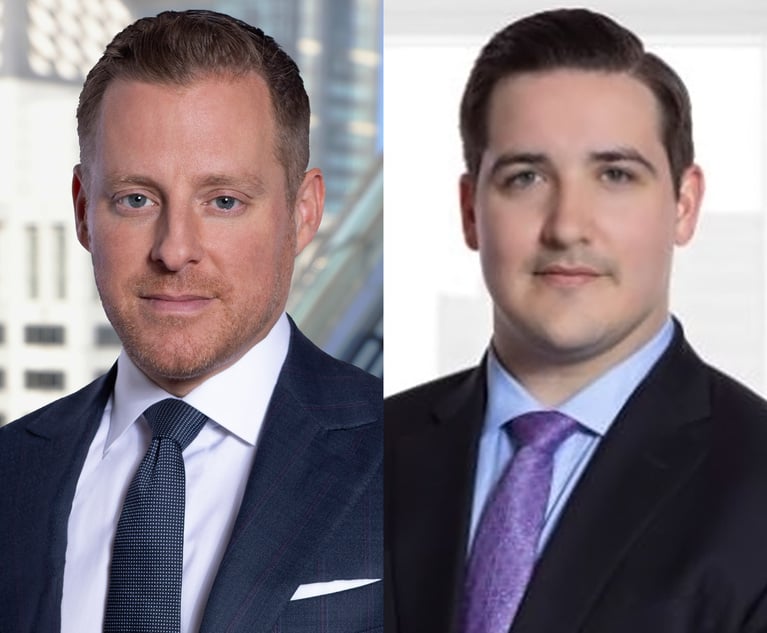Prosecutions of Big Pharma Over Opioids Unlikely, Panel Says
Courts and prosecutors have a frontline role to play in the fight against the opioid epidemic, but don't expect high-ranked officials from Big Pharma to face criminal prosecution any time soon, a group of criminal justice officials from across the country said during a panel discussion March 16.
March 16, 2018 at 06:08 PM
4 minute read
 Photo: Shutterstock.com
Photo: Shutterstock.com
Courts and prosecutors have a frontline role to play in the fight against the opioid epidemic, but don't expect high-ranked officials from Big Pharma to face criminal prosecution any time soon, a group of criminal justice officials from across the country said during a panel discussion March 16.
“I wouldn't get anyone's hopes up, There's just a host of problems,” New York City's Special Narcotics Prosecutor Bridget Brennan told the audience, adding that statute of limitations issues might be the biggest hurdle in prosecuting pharmaceutical executives.
The comments came during a discussion hosted by Penn Law's Center for Ethics and the Rule of Law aimed at addressing the available criminal and civil justice responses to the opioid crisis. Along with Brennan, Delaware Attorney General Matthew Denn, Georgia Attorney General Chris Carr, chief judge of Philadelphia's Veterans Court Patrick Dugan and others were part of the panel examining what role law enforcement can play in the growing crisis.
Although the officials agreed criminal prosecutions won't likely rise to the level of the pharmaceutical companies, courts have a strong role to play when it comes to holding doctors accountable for reckless prescriptions and getting those in need into treatment. At a time when there is some discussion of decriminalizing low-level possession of certain drug-related offenses, several on the panel said the roles of the court are increasingly important.
“What is going to fill that void if we stop prosecuting them?” Dugan said. “I can be the big, older brother who is needed to be tough on them. As a court I have that hammer that perhaps a doctor or a parent has lost.”
Denn agreed, and said his office continues to press charges for possession in all but extremely low-level cases.
“The criminal justice system can be extraordinarily difficult, but in the long term, they're better off in the system,” Denn said. “It can be tougher to get well without any structure.”
The conversation was wide-ranging, and touched on, among other things, the differences in how law enforcement dealt with the crack versus opioid epidemics, new data-driven approaches to keep tabs on high-prescribing doctors, and about President Donald Trump's efforts to tackle the issue, including creating a task force and saying that drug dealers should receive the death penalty.
Carr lauded the president for speaking out publicly about the issue, and said, regardless of practicality, he could understand the sentiment behind Trump's comments regarding the death penalty for drug dealers. However, he said, more needs to be done on the part of Congress to raise money to address the issue.
Dugan agreed, saying the epidemic is draining the court's resources to the point where courts have to rely on nonprofit therapy services because there is no money for publicly funded social services.
“Talk, talk, talk,” he said. “Show us the money. We can't bring enough people in the court room. We have to rely on nonprofits. Give me more doctors at the VA.”
The issue of having the death penalty for drug dealers has recently arisen in Delaware, Denn said, noting that state lawmakers are looking to revise a law that would allow prosecutors to charge dealers for causing overdose deaths. However, Denn said, prosecutors will need to strike a balance between holding dealers accountable, while making sure that the public continues to take advantage of so-called Good Samaritan laws that give immunity to people who alert law enforcement when someone is overdosing.
During the discussion several questions revolved around holding not only doctors and dealers accountable, but also drug manufacturers and marketers. But many on the panel agreed those issues might be better addressed by the civil system and with regulatory changes that would help ensure a similar situation does not occur in the future.
“All problems can't be dealt with in the criminal context,” Brennan said.
This content has been archived. It is available through our partners, LexisNexis® and Bloomberg Law.
To view this content, please continue to their sites.
Not a Lexis Subscriber?
Subscribe Now
Not a Bloomberg Law Subscriber?
Subscribe Now
NOT FOR REPRINT
© 2024 ALM Global, LLC, All Rights Reserved. Request academic re-use from www.copyright.com. All other uses, submit a request to [email protected]. For more information visit Asset & Logo Licensing.
You Might Like
View All
Phila. Judge Upholds $68.5M Verdict Over Construction Worker's Death
3 minute read
Phila. Jury Awards $15M to Woman Who Slipped on Apartment Building Stairs
4 minute read
Plaintiffs Seek Redo of First Trial Over Medical Device Plant's Emissions
4 minute readTrending Stories
- 1Continuing Consolidation : The Biggest Legal Tech M&As of 2024
- 2FTC Announces HSR Final Rulemaking Impacting Premerger Filings
- 3NJ Cut Down on Open Judgeships in 2024, But Dozens of Vacancies Linger
- 4How to Add PR When You’ve Already Taken an ‘L’
- 5'Be Comfortable Being Uncomfortable': Pearls of Wisdom From 2024 GC Q&As
Who Got The Work
Michael G. Bongiorno, Andrew Scott Dulberg and Elizabeth E. Driscoll from Wilmer Cutler Pickering Hale and Dorr have stepped in to represent Symbotic Inc., an A.I.-enabled technology platform that focuses on increasing supply chain efficiency, and other defendants in a pending shareholder derivative lawsuit. The case, filed Oct. 2 in Massachusetts District Court by the Brown Law Firm on behalf of Stephen Austen, accuses certain officers and directors of misleading investors in regard to Symbotic's potential for margin growth by failing to disclose that the company was not equipped to timely deploy its systems or manage expenses through project delays. The case, assigned to U.S. District Judge Nathaniel M. Gorton, is 1:24-cv-12522, Austen v. Cohen et al.
Who Got The Work
Edmund Polubinski and Marie Killmond of Davis Polk & Wardwell have entered appearances for data platform software development company MongoDB and other defendants in a pending shareholder derivative lawsuit. The action, filed Oct. 7 in New York Southern District Court by the Brown Law Firm, accuses the company's directors and/or officers of falsely expressing confidence in the company’s restructuring of its sales incentive plan and downplaying the severity of decreases in its upfront commitments. The case is 1:24-cv-07594, Roy v. Ittycheria et al.
Who Got The Work
Amy O. Bruchs and Kurt F. Ellison of Michael Best & Friedrich have entered appearances for Epic Systems Corp. in a pending employment discrimination lawsuit. The suit was filed Sept. 7 in Wisconsin Western District Court by Levine Eisberner LLC and Siri & Glimstad on behalf of a project manager who claims that he was wrongfully terminated after applying for a religious exemption to the defendant's COVID-19 vaccine mandate. The case, assigned to U.S. Magistrate Judge Anita Marie Boor, is 3:24-cv-00630, Secker, Nathan v. Epic Systems Corporation.
Who Got The Work
David X. Sullivan, Thomas J. Finn and Gregory A. Hall from McCarter & English have entered appearances for Sunrun Installation Services in a pending civil rights lawsuit. The complaint was filed Sept. 4 in Connecticut District Court by attorney Robert M. Berke on behalf of former employee George Edward Steins, who was arrested and charged with employing an unregistered home improvement salesperson. The complaint alleges that had Sunrun informed the Connecticut Department of Consumer Protection that the plaintiff's employment had ended in 2017 and that he no longer held Sunrun's home improvement contractor license, he would not have been hit with charges, which were dismissed in May 2024. The case, assigned to U.S. District Judge Jeffrey A. Meyer, is 3:24-cv-01423, Steins v. Sunrun, Inc. et al.
Who Got The Work
Greenberg Traurig shareholder Joshua L. Raskin has entered an appearance for boohoo.com UK Ltd. in a pending patent infringement lawsuit. The suit, filed Sept. 3 in Texas Eastern District Court by Rozier Hardt McDonough on behalf of Alto Dynamics, asserts five patents related to an online shopping platform. The case, assigned to U.S. District Judge Rodney Gilstrap, is 2:24-cv-00719, Alto Dynamics, LLC v. boohoo.com UK Limited.
Featured Firms
Law Offices of Gary Martin Hays & Associates, P.C.
(470) 294-1674
Law Offices of Mark E. Salomone
(857) 444-6468
Smith & Hassler
(713) 739-1250






